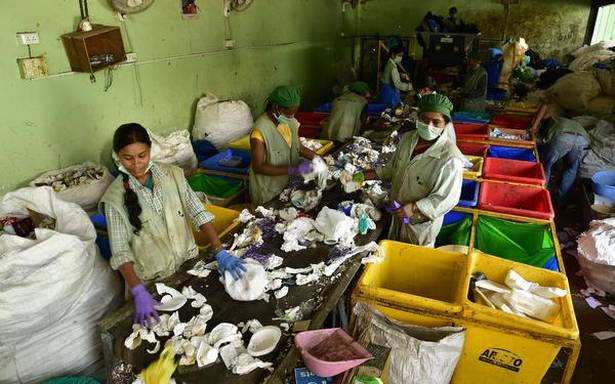Civic body told to submit plan of action for achieving 100% segregation at source by end of March
The Bruhat Bengaluru Mahanagara Palike (BBMP) has been directed to achieve 100% segregation of waste at source, take immediate action for biomining the legacy waste in waste processing sites and comply with the Solid Waste Management (SWM) Rules, 2016. These are just some of the directions issued by Subhash B. Adi, chairman of the State Level Committee constituted by the National Green Tribunal.
Recently, in a meeting with officials of both BBMP and the Karnataka State Pollution Control Board (KSPCB), Mr. Adi pulled up the civic body for not showing appropriate progress in waste management as per SWM Rules, 2016. He also expressed displeasure over the delay in putting in place the new tenders that envisage separate collection of different streams of waste, and the low segregation levels.
100% segregation
BBMP officials were directed to submit a plan of action for achieving 100% segregation at source ward-wise by end of March. Mr. Adi has also directed the civic body to install GPS on all vehicles transporting waste and provide details of the same to KSPCB.
The BBMP has filed an affidavit in the High Court seeking more time, admitting that achieving 100% segregation at source by March-end would not be possible.
BBMP Special Commissioner (SWM) D. Randeep told The Hindu that over a period of time, the civic body had been able to clear a majority of black spots across the city, improve segregation levels and reduce the quantum of mixed waste.
He said 100% segregation at source would be possible only if new tenders, dry waste collection centres and effective dry waste collectors are available in all 198 wards. The new tenders have been activated in 63 wards. The civic body was hoping to put them in place in at least 150 wards over the next two months, he said. There were 120 DWCCs, and the BBMP had floated tenders for around 35 centres. “However, this includes centres that need to be demolished and rebuilt, where major repairs have to be taken up and new structures in wards without DWCCs,” he said.
Leachate treatment
The KSPCB officials, who were present at the meeting, pointed out that 750 tonnes of rejects are being stored at Doddabidarakallu processing plant and 1 lakh litres of leachate, which is stored at the site, is flowing into low-lying areas. Though a 25 KLD leachate treatment plant was established at the site, it was being operated at a capacity of 6 KLD. At Kannahalli plant, 5,000 tonnes of waste is being stored in the open and the 25 KL leachate tank overflowed into an abandoned quarry.
BBMP officials, meanwhile, stated that suitable technology selection for leachate treatment had been placed before the Technical Guidance Committee, and the technology is expected to be selected shortly.
Source: Read Full Article

